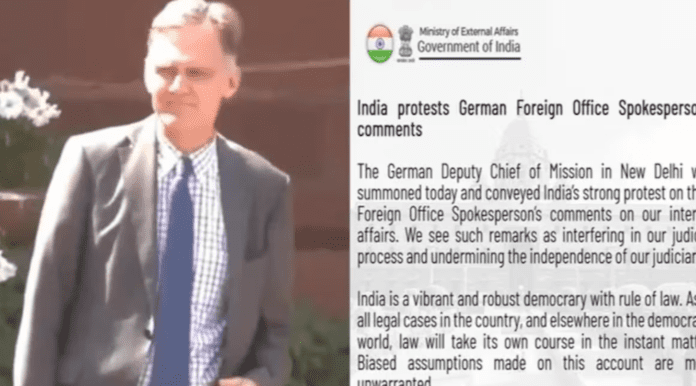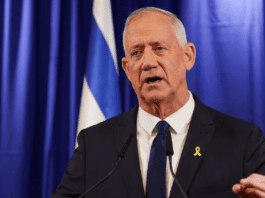The Ministry of External Affairs confirmed that the German Deputy Chief of Mission in New Delhi was summoned on Saturday. During the meeting, India expressed its strong protest regarding the comments made by the German Foreign Office Spokesperson on internal Indian affairs.
The arrest of Delhi Chief Minister and Aam Aadmi Party Chief, Arvind Kejriwal, by the Enforcement Directorate in connection with an excise policy case has sparked significant international attention. Notably, Germany’s response, advocating for a fair and impartial trial for Kejriwal, has ignited a diplomatic discourse.
India, on the other hand, staunchly asserts that such matters are internal and urges foreign nations to abstain from interference. This essay delves into the nuances of this diplomatic exchange, analyzing India’s stance, examining Germany’s remarks, and exploring the broader implications of international commentary on domestic affairs.
India’s Assertive Stance
India’s response to Germany’s comments reflects its unwavering stance on maintaining sovereignty over internal matters. Kejriwal’s arrest, deemed a domestic issue by Indian authorities, has been met with stringent resistance against external commentary.
The Indian government, echoing its past reactions to similar incidents, emphasizes the principle of non-interference in domestic affairs by foreign entities. This assertion of sovereignty underscores India’s commitment to preserving its judicial autonomy and domestic political processes.
Germany’s Diplomatic Intervention
Germany’s Foreign Ministry spokesperson, Sebastian Fischer, broke the diplomatic silence by expressing concerns over Kejriwal’s arrest. Fischer’s remarks, advocating for a fair trial and emphasizing the presumption of innocence, constitute a notable diplomatic intervention.
Germany’s stance underscores its commitment to democratic principles and the rule of law. By urging for transparency and impartiality in Kejriwal’s case, Germany positions itself as a champion of human rights and due process. However, India perceives such commentary as unwarranted interference, triggering diplomatic tensions between the two nations.
Implications of International Commentary
The clash between India’s assertion of sovereignty and international calls for transparency raises pertinent questions about the role of foreign nations in domestic affairs. While India upholds the principle of non-interference, global actors often voice concerns over human rights violations and judicial processes in other countries.
This tension between sovereignty and international norms highlights the complex dynamics of contemporary diplomacy. Moreover, it underscores the evolving nature of state relations in an interconnected world, where domestic actions can reverberate globally.
India’s Response to Foreign Commentary
India’s reaction to Germany’s comments echoes its previous responses to international scrutiny. The Indian government’s assertion that Kejriwal’s arrest is an internal matter reflects its commitment to safeguarding national sovereignty. By categorizing foreign commentary as unwarranted interference.
India aims to preserve its autonomy in handling domestic affairs. This response aligns with India’s historical approach to diplomatic relations, emphasizing bilateral dialogue and mutual respect for sovereignty. However, it also raises questions about the limits of diplomatic discourse and the balance between national interests and international norms.
Germany’s Position on Human Rights and Justice
Germany’s advocacy for a fair trial for Kejriwal aligns with its broader commitment to human rights and democratic values. As a staunch supporter of the rule of law, Germany prioritizes transparency and accountability in judicial proceedings.
By expressing concerns over Kejriwal’s arrest, Germany seeks to uphold international standards of justice and ensure the protection of individual rights. However, its intervention in India’s domestic affairs has sparked controversy, highlighting the complexities of diplomatic engagement in an increasingly interconnected world.
Broader Diplomatic Implications
The diplomatic exchange between India and Germany sheds light on broader trends in international relations. The clash between sovereignty and human rights underscores the challenges of navigating diplomatic discourse in an era of globalization.
While states assert their right to self-determination, international norms and values often intersect with domestic affairs, leading to tensions and disagreements. The Kejriwal case serves as a microcosm of these broader dynamics, highlighting the complexities of state relations in a rapidly changing world.
The arrest of Delhi Chief Minister Arvind Kejriwal and the subsequent international response exemplify the complexities of contemporary diplomacy. India’s assertion of sovereignty clashes with Germany’s advocacy for human rights and justice, underscoring the tension between national autonomy and international norms.
As the diplomatic discourse unfolds, it raises pertinent questions about the role of foreign nations in domestic affairs and the balance between sovereignty and global accountability. Ultimately, the Kejriwal case serves as a reminder of the evolving nature of state relations in an interconnected world, where domestic actions have far-reaching international implications.
India Criticizes Germany’s Remarks on Arvind Kejriwal’s Arrest in Delhi Liquor Policy Case
India has rebuked Germany’s comments regarding the arrest of Arvind Kejriwal in the Delhi liquor policy case, labeling them as “biased and unwarranted.” This response comes after Germany expressed its expectation for India to uphold “basic democratic principles” and ensure a fair trial for the detained leader.
During a press conference, the German foreign ministry was questioned about Berlin’s stance on Kejriwal’s arrest ahead of the Lok Sabha elections. In response, the spokesperson acknowledged awareness of the case, emphasizing India’s democratic status.
“We have taken note; India is a democratic country. We assume and expect that the standards relating to independence of the judiciary and basic democratic principles will also be applied in this case. Like anyone facing accusations, Mr. Kejriwal is entitled to a fair and impartial trial, including the unrestricted use of all available legal avenues. The presumption of innocence is a central element of the rule of law and must apply to him,” the spokesperson stated.



